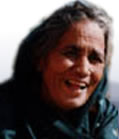 |
 |
||
 |
|||
|
RELATED THEMES culture and customs community activities spiritual beliefs OTHER LOCAL THEMES BACKGROUND |
festivals
The interviews are studied with references to festivals, many of which are religious - Muslim, Buddhist or Hindu - although some are linked to the agricultural cycle, such as the widely celebrated Spring Festival (Vasant Panchami). There is much detail about festival activities and associated foods, as well as the gods and goddesses that are celebrated - these are often identified with a particular locality or natural feature such as a sacred tree or stream. People also mention melas or fairs that seem to be quite regular and less formal than the large annual festivals. These fairs serve an important social function, as one narrator (India 11) explains: "It's basically to enjoy good meals. We peasants get no leisure. So for entertainment we have fairs - for socialising. Then we are fresh to re-start our tough routine. These fairs fill us with joy.and that's the reason we have these festivals." Opinion is divided as to the continued popularity of festivals. Some assert they are as important as ever. India 9, for example, doesn't feel there have been many changes: "All the festivals and village fairs with religious backgrounds are still held in their traditional fashion. People still take an interest in them. There is no change in this field." Another narrator (India 2) believes that the only change is that they are even better: "the fairs and festivals are perhaps celebrated in the old way except that these days, because of the enhancement in economic condition of people, they are celebrated in a colourful and better way." Sometimes it is not entirely clear whether a narrator is describing a festival as it is currently celebrated, or as it used to be. And some definitely feel that modern forms of entertainment are taking over in popularity, especially from less formal events: "There are many festivals when people sit at home, sing and narrate interesting episodes and jokes.During such festivals the older people offer liquor to the deities and enjoy drinking. But nowadays this practice is getting lost. All this has been replaced by TV, radio, cinema. People are getting more inclined towards the modern kinds of entertainment. This is all due to education. Today they can watch the best of competitions, games, sports not only national but international on the TV." (India 18) Another (India 28) makes a related point about outside influences: "Yes, [traditional celebrations] are being kept alive even today. But in the villages located near the roads, they are gradually disappearing." quotes about festivals"[Vasant Panchami] is a traditional festival, involving lots of ceremonies. It's a festival connected to our fields, our profession. It tells us that it's time we plough the fields. On Vasant Panchami morning khichdi (rice and lentils cooked together) is prepared, it being a special dish for the day. Puris (type of fried bread) are made in the evening. Houses are decorated with flowers." "On [the Spring Festival] sickle, pickaxe, spade, plough are taken to the field, cow-dung.., a little bit of grain.., and leaves of the panya tree are also taken [and] all these are worshipped. On this day [also] the Brahmin looks up the panchang (astrological calendar) and gives the forecast regarding the weather and produce for the coming year. We worship the fields for a good produce." [Our main festival] is Losar, celebrated in the month of Falgun (February/March). This being our main festival we celebrate it with great gusto. We plant green seedlings 15 days before the festival... We also use greenery, which we get by planting barley with kees. We make different kinds of food delicacies, and chang (homemade wine). [Chang] is made of rice and is white like buttermilk. The intoxicating content is very mild like beer. Only men and old people drink it. We make puris ( type of fried bread) and other delicacies of flour in different designs. "One [festival] is Shaberat. Many different things are cooked. Our sisters are given clothes, money and pulses. The second one is Roze (literally, to fast; Ramadan). We fast for the whole day, eat early in the morning at 3am and then again in the evening by 6 or 7pm. We have to do the Namaz (prayers) five times a day.This is followed by the festival of Id. We buy new clothes for our children. All sorts of delicacies are cooked and those who can afford it also bring a goat." ".during the month of Baisakh (April/May) there used to be the children's festival. Children used to go to every field and ask the mistress of the field for wheat. Then all the children took their wheat together to the banks of the Ganga. There they roasted and cleaned the wheat for eating and brought some home for the others.Now this festival has also come to an end.. It used to be good fun..." |
|